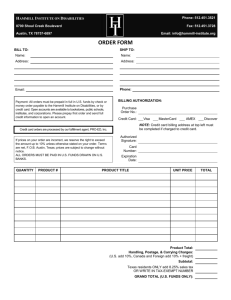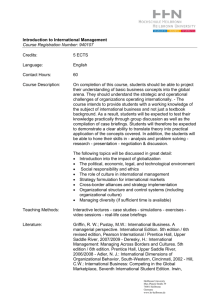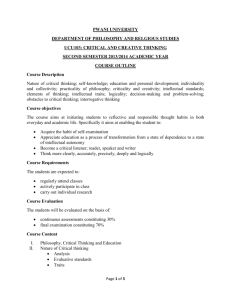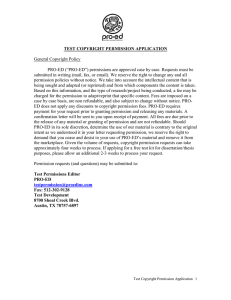(EDS 610) Syllabus of Record: Studies in Emotional Impairment Course Description:
advertisement
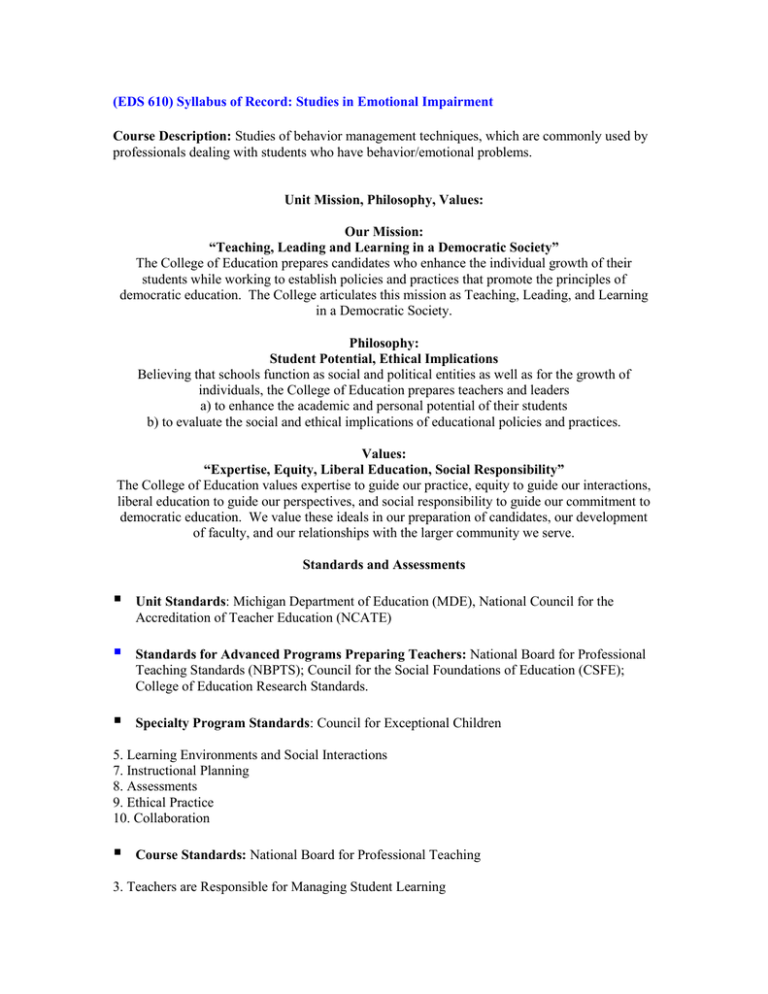
(EDS 610) Syllabus of Record: Studies in Emotional Impairment Course Description: Studies of behavior management techniques, which are commonly used by professionals dealing with students who have behavior/emotional problems. Unit Mission, Philosophy, Values: Our Mission: “Teaching, Leading and Learning in a Democratic Society” The College of Education prepares candidates who enhance the individual growth of their students while working to establish policies and practices that promote the principles of democratic education. The College articulates this mission as Teaching, Leading, and Learning in a Democratic Society. Philosophy: Student Potential, Ethical Implications Believing that schools function as social and political entities as well as for the growth of individuals, the College of Education prepares teachers and leaders a) to enhance the academic and personal potential of their students b) to evaluate the social and ethical implications of educational policies and practices. Values: “Expertise, Equity, Liberal Education, Social Responsibility” The College of Education values expertise to guide our practice, equity to guide our interactions, liberal education to guide our perspectives, and social responsibility to guide our commitment to democratic education. We value these ideals in our preparation of candidates, our development of faculty, and our relationships with the larger community we serve. Standards and Assessments Unit Standards: Michigan Department of Education (MDE), National Council for the Accreditation of Teacher Education (NCATE) Standards for Advanced Programs Preparing Teachers: National Board for Professional Teaching Standards (NBPTS); Council for the Social Foundations of Education (CSFE); College of Education Research Standards. Specialty Program Standards: Council for Exceptional Children 5. Learning Environments and Social Interactions 7. Instructional Planning 8. Assessments 9. Ethical Practice 10. Collaboration Course Standards: National Board for Professional Teaching 3. Teachers are Responsible for Managing Student Learning D. Teachers Regularly Assess Student Progress E. Teachers Are Mindful of Their Principal Objectives 4. Teachers Think Systematically About Their Practice and Learn from Experience A. Teachers Are Continually Making Difficult Choices That Test Their Judgment B. Teachers Seek the Advice of Others and Draw on Education Research and Scholarship to Improve Their Practice 5. Teachers are Members of Learning Communities A. Teachers Contribute to School Effectiveness by Collaborating with Other Professionals B. Teachers Work Collaboratively with Parents Common Course Assessment: EI Behavior Change Plan Major Topics Classroom Management Models Cultural and Economic Impact Crisis Intervention Positive-Behavior Support Self-Management Strategies Wrap-Around Services and Family Partnerships Course Knowledge Base Breen, M. J., & Fielder, C. R. (1996). Behavioral approach to assessment of youth with emotional/behavioral disorders. Austin, TX: PRO-ED. Brentro, L. K., & Van Bockern, S. (1990). Reclaiming youth at risk. Bloomington, IN: National Educational Service. Cipani, E. (1998). Classroom management for all teachers: 11 effective plans. Upper Saddle River, NJ: Prentice Hall. Crisis Prevention Institute, Inc. (1987). Nonviolent Crisis Intervention: Participant workbook. Brookfield, WI: Author. Danforth, S., & Boyle, J. R. (2000). Cases in behavior management. Upper Saddle River, NJ: Prentice Hall. Kerr, M. M., & Nelson, C. M. (1998). Strategies for managing behavior problems in the classroom (3rd ed.). Upper Saddle River, NJ: Prentice Hall. Loeber, R., & Stoutamer-Loeber, M. (1998). Development of juvenile aggression and violence: Some common misconceptions and controversies. American Psychologist, 53, 242-259. Long, N. J., & Morse, W. C (1996). Conflict in the classroom: The education of at-risk and troubled students (5th Edition). Austin TX: Pro-Ed. Lovett, H. (1998). Learning to listen: Positive approaches and people with difficult behavior. Baltimore: Paul H. Brookes. Michigan Department of Education (February, 2000). Positive behavior support for ALL Michigan students: Creating environments that assure learning. Lansing, MI: Author, Office of Special Education and Early Intervention Services Morgan, R. K. (1999). Case studies in child and adolescent psychopathology. Upper Saddle River NJ: Prentice Hall. Walker, H. M. (1997). First step to success—An early intervention program for antisocial kindergarteners. Reston, VA: Council for Exceptional Children. Walker, H. M., Colvin, G., & Ramsey, E. (1995). Antisocial behavior in school: Strategies and best practices. Detroit: Brooks/Cole. Wood, M. (1986). Developmental theory in the classroom. Austin, TX: PRO-ED. Wood, M., & Long, N. (1990). Life Space Intervention: Talking to children and youth in a crisis. Austin, TX: Pro-Ed.
